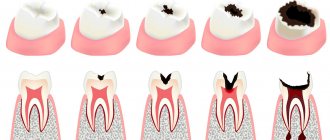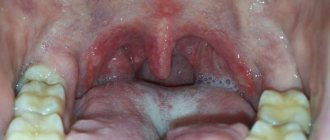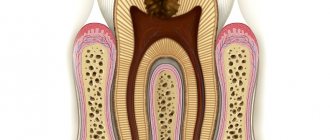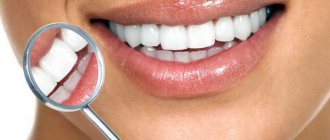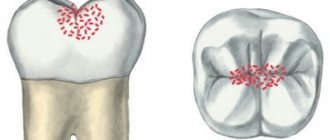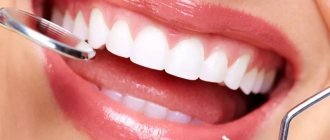Author of the article:
Soldatova Lyudmila Nikolaevna
Candidate of Medical Sciences, Professor of the Department of Clinical Dentistry of the St. Petersburg Medical and Social Institute, Chief Physician of the Alfa-Dent Dental Clinic, St. Petersburg
Teeth whitening is one of the most popular cosmetic procedures in dentistry. Every year more and more people, wanting to get a snow-white smile, resort to this service. Moreover, thanks to popularization and modern technologies, it has become available to almost everyone.
Whitening is a purely aesthetic procedure. It does not improve dental health and is contraindicated for pregnant women and people with sensitive tooth enamel. Although in these cases, dentists can choose the most suitable conditions. Therefore, the dream of an attractive bright smile can easily become a reality; it is only important to carefully listen to the advice of specialists and follow all their instructions.
The procedure itself is very simple - it can be carried out both in the office and at home. All methods are based on a single principle and differ only in details, although the intensity of the result, exposure time and probable harm depend on the latter.
If you have already decided to whiten your teeth, study all the nuances. Bright white color is not natural and achieving it causes some damage to the enamel. In addition, the procedure may have other side effects.
Let's talk about what to do if your teeth hurt after whitening.
Side effects
The appearance of pain during whitening is very individual and depends on many factors, including tooth sensitivity, the presence of damage to the enamel, and so on. In dentistry, there are a large number of effective methods to make the procedure itself painless. But what to do if the pain appears after. Like any medical intervention, bleaching has consequences due to the effects of instruments and drugs.
The most popular side effects from whitening are divided into three groups:
- toothache;
- gum irritation;
- increased sensitivity of teeth.
Increased sensitivity
It is this side effect that most often appears after teeth whitening. Unfortunately, despite its prevalence, doctors do not yet have a consensus on the causes of this phenomenon. Since sensitivity manifests itself differently each time, it is very difficult to predict the reaction of a particular patient, the severity and speed of treatment. Sensitivity can range from subtle discomfort to sharp, throbbing pain. Usually this effect goes away within a few seconds or minutes after the irritant stops acting on the enamel.
Tooth sensitivity may increase both during the procedure and after its completion.
If pain occurs during teeth whitening, then all work has to be stopped. The fact is that the basis of any lightening method is the effect on the enamel of active oxygen, which is released from special gels during the decomposition of hydrogen peroxide. It destroys the coloring pigment, penetrating deeply into the tooth tissue, which can cause irritation of the nerves. In this case, the only option is to stop using the drug.
Next, you need to take a break; if after that the problem does not appear, you can make another attempt by applying a less concentrated composition or shortening the period of exposure. This should take away the pain during whitening. If this does not happen, and discomfort appears again, you will have to stop the course and figure out the reasons. You may need to choose a different method or opt for a teeth-friendly professional cleaning. Of course, it will not make your teeth snow-white, but it will allow you to get their natural shade, lightening them by one or two tones.
If increased sensitivity appeared after the procedure during the recovery period, it is also necessary to understand and eliminate the reasons for its occurrence.
The most common are the following:
- negative effect from eating various foods - foods and drinks with high acidity can worsen the condition of teeth;
- manifestation of a reaction to external stimuli - heat, cold, physical contact;
- Increased sensitivity can be a sign of various diseases that are not directly related to teeth.
To eliminate the risk of tooth sensitivity as much as possible, dentists recommend using special toothpastes and rinses after whitening, as well as following a special diet. In the first days after the procedure, avoid the aggressive effects of smoking, cold, hot and acidic foods. Most likely, in three to four days the sensitivity will return to normal.
Toothache
In addition to increased sensitivity, which can be a completely normal phenomenon after the procedures, the patient may experience another unpleasant effect - a full-blown toothache. If you feel that your teeth really hurt and this cannot be attributed to temporary manifestations of their increased sensitivity, you should consult a specialist. Since the appearance of pain can serve as a signal of more serious problems, which are quite difficult to eliminate.
Teeth whitening has a strong impact on the condition of the oral cavity, so there are a number of contraindications in which the procedure should be abandoned.
To avoid any unpleasant surprises during or after whitening, you need to eliminate the following problems:
- caries;
- enamel diseases;
- defects on the tooth surface, chips and cracks;
- leaky seals
- gum disease and other soft tissue problems.
In most cases, toothache during whitening occurs due to the fact that the gel penetrates deep inside the tooth. This occurs due to the fact that the enamel contains cracks, chips, carious cavities and other defects. In addition, leaky seals can cause problems. Therefore, it is very important to identify these problems at the stage of preparation for cleaning, before any manipulations begin. It is necessary to undergo a full examination of the oral cavity, and then carry out all the necessary health procedures.
What happens when peroxide gets into the tooth structure? Active oxygen seeps through defects in the enamel, reaches the pulp and begins to affect the nerve endings, causing their irritation. At this point, the patient begins to experience toothache. And, accordingly, the longer the exposure time and the concentration of the active substance, the stronger the discomfort and the more dangerous the consequences. In the worst case, all this can lead to full-fledged inflammation - pulpitis. And this disease already requires serious treatment.
Therefore, if you notice chips or scratches on the enamel, or, worse, the tooth hurt even before whitening, be sure to contact a specialist.
If you want to avoid pain during and after teeth whitening, pay great attention to preparing for the procedure. Or use more gentle methods, for example, ASEPTA PLUS Gentle Whitening paste, which gently cleanses, returning teeth to their natural color.
Causes of discomfort
If your teeth hurt very badly after whitening, you did not eat food, did not violate the dentist’s recommendations, and the discomfort does not stop, there may be several reasons:
- an error when choosing a technique or when calculating the dosage of a lightening agent;
- using aggressive “home” remedies to enhance the effect - lemon juice, soda, salt - all these products from “grandmother’s chest” can damage the tooth or gum surface and cause infection;
- inflammation - occurs if the procedure was carried out for caries, periodontal disease, or if plaque was poorly removed;
- lightening in the presence of contraindications;
- chips, cracks in the enamel, dental pathologies can cause severe pain in the teeth after whitening, what to do in this case - the most reasonable thing is to consult a doctor;
- the presence of leaky fillings, exposure of necks and roots with advanced periodontal disease.
After lightening, you should avoid hot, cold, and spicy foods for at least a few hours - they can also cause pain.
Why do teeth become sensitive after whitening?
In the first days after the procedure, the enamel will be more sensitive; minor pain and reaction to temperature stimuli may occur. This is a completely normal phenomenon, since the teeth were exposed to aggressive external influences. However, there should not be acute pain - this situation indicates that the doctor chose the wrong dosage of the active substance.
Even the safest and gentlest whitening methods still have a negative effect on the enamel, destroying its mineral composition. Therefore, it is necessary to introduce healthy foods into the diet (see the list below), as well as use various preparations that will strengthen your teeth - in pharmacies you can purchase special pastes or compositions that are applied to the teeth for a few minutes.
How long does pain last?
How many days do teeth hurt after whitening is the second most popular question after the cost of the service. Everything is individual and depends on the state of health and characteristics of the human body.
When lightening is carried out correctly, the discomfort goes away immediately after the procedure - as soon as the active composition is removed from the tooth surface. But with increased sensitivity of the enamel, it can last for a short time.
The discomfort completely disappears on the second or third day. In some cases, the period may extend to 5-10 days.
How long teeth hurt after whitening is also influenced by the patient’s behavior. It is important to follow the doctor’s recommendations to speed up the recovery process and avoid consequences.
How to speed up the rehabilitation process
Main rules of behavior after the procedure:
- refuse hot/cold, sour, spicy, too hard foods for the next 3 hours;
- in the first two days, limit yourself to lukewarm soft foods;
- remove dyes – natural and synthetic – from your diet for the next couple of days if you do not want your teeth to change color;
- focus on foods high in calcium and magnesium;
- use a soft-bristled brush until the discomfort goes away;
- do not use paste containing more than 50 RDA of abrasives;
- Take complex vitamins regularly; you can additionally drink calcium and magnesium;
These recommendations will help you reduce the time during which your teeth hurt after whitening and enjoy a Hollywood smile.
Dietary advice: what is prohibited?
Using drugs with an aggressive chemical composition that have the ability to change the shade of enamel and damage its texture is something that should not be done after teeth whitening.
List of unauthorized foods and drinks:
- black tea, coffee, red wine, bright-colored natural juices (pomegranate, cherry, etc.);
- chocolate;
- some spices (mustard, cardamom, soy sauce, ketchup, balsamic vinegar);
- fresh vegetables, berries and fruits - beets, dark grapes, currants, carrots.
A strict ban is imposed on the consumption of colored sodas (for example, cola). These are real killers even for completely healthy teeth, and after whitening they are especially harmful. The acids and pigments present in such drinks instantly nullify all the efforts of the dentist.
If it is not possible to refuse the listed products, then you should at least rinse your mouth with water after taking them. This way, staining and corroding components will not linger long on the surface of the teeth.
How to relieve or soothe pain at home
While minor pain is easy to experience and even forget about, severe pain can seriously complicate life. What should you do if your teeth hurt very much after whitening, and an immediate visit to the clinic is impossible?
At home, you can relieve pain with fluoride toothpaste, but the fluoride content must be at least 1500 ppm. This paste has high remineralizing activity; it normalizes the mineral composition of the enamel, strengthens it and eliminates microdefects. But you should not abuse this remedy either.
The same method is useful when your teeth hurt after whitening with strips, which you definitely shouldn’t do - try to relieve the pain with cold or, on the contrary, with a warm compress. Pain after the strips indicates that the procedure was performed incorrectly. The strips with the active gel were overexposed, as a result the enamel was damaged, irritation occurred, and sensitivity increased.
Pastes and rinses with chamomile, calendula, sage, and propolis will have an analgesic effect. Extracts of these herbs have an antibacterial effect and eliminate inflammation.
Experts' opinion
Asepta Remineralization toothpaste is suitable for remineralizing weakened tooth enamel and protecting gums from inflammation. The main advantages of the product include:
- Quick restoration of damaged tooth enamel;
- Strengthening tooth enamel, restoring the effect on gums;
- Protecting gums from inflammation.
The paste does not contain fluorides, sodium lauryl sulfate, antiseptics, or aggressive abrasives. The effectiveness of the product has been proven at the Department of Preventive Dentistry of St. Petersburg State Medical University named after. I.P. Pavlova in 2015. Based on research, the conclusion was substantiated that toothpaste has pronounced remineralizing and desensitizing effects. After four weeks of use, its remineralizing efficiency was 63.6%*.
Consumer Reviews
Feliĉo (irecommend.ru):
“Good day everyone! I really like Asepta toothpastes; I have already talked about one of them - for sensitive gums and teeth.
Naturally, I couldn’t help but try a new product: ASEPTA PLUS Remineralization toothpaste...
...What does the manufacturer promise us?
Advantages:
- High concentration of hydroxyapatite – quickly restores damage to tooth enamel;
- Thermal mud – strengthens tooth enamel, has a restorative effect on gums;
- Extracts of calendula and eleutherococcus – protect gums from inflammation;
Does not contain fluorides, sodium lauryl sulfate, antiseptics, aggressive abrasives. Suitable for daily use.
The taste is mild, I would say sweet mint, but the paste is a great breath freshener. It is very pleasant to use, it does not burn or irritate the oral cavity.
It copes wonderfully with plaque, leaving teeth smooth and shiny after brushing. I didn't notice any whitening effect.
It is difficult for me, as a simple consumer, to judge objectively about the restoration of enamel and strengthening of the gums, but during use, bleeding has never made itself felt.
I liked the new product, I highly recommend it!”
Annette_88 (irecommend.ru):
“Why is remineralization of tooth enamel necessary? And to protect teeth from caries, and to combat dental hypersensitivity and simply to restore mineral balance. From time to time, for preventive purposes, I use special pastes for remineralization. This time I decided to try a paste from the Russian brand Asepta. This paste has a budget price (it cost me 181 rubles 82 kopecks with a discount) and is sold in many pharmacies (I bought it at the Farmland pharmacy).
Professional toothpaste REMINERALIZATION Asepta. Volume 75 ml. Country Russia. The toothpaste is sold in a cardboard box in white and green colors. The box contains all the necessary information about the product. The tube is green, made of soft plastic, and also contains brief information. A foil disk under the lid is used to control the first opening. The lid is screw-on. Foaming is average, closer to low (there is no SLS in the composition!). The consistency is medium, closer to liquid. The color of the paste is light green, mint. The aroma is mint, herbal notes are felt...
...The optimal degree of abrasiveness (RDA 100) allows you to maintain the natural whiteness of your teeth without damaging the enamel and gums. High concentrations of hydroxyapatite and thermal mud help strengthen teeth and gums and reduce sensitivity...
...I used the paste once a day, in the morning. During the day and evening I used other toothpastes (I try to brush my teeth 3 times a day). The paste is ideal for morning cleansing, as it perfectly freshens breath. For a couple of hours after cleaning, your mouth feels clean and fresh, after which this feeling gradually fades away. Having read the list of active ingredients on the box, I couldn’t even imagine what the taste and aroma of the paste would be. As a result, I discovered that the paste is classically minty, with subtle herbal notes.
When brushing your teeth, the paste feels comfortable: it does not burn or irritate your mouth, and does not dry out the mucous membranes. The paste copes well with plaque - perhaps this is due to the fact that I use a hard brush and brush my teeth very carefully, and also additionally use an irrigator. In order for the properties of the paste to be revealed, the manufacturer recommends brushing your teeth for at least 2-3 minutes, I try to maintain a time of 3 minutes. The paste consumption is standard. The consistency of the paste is closer to liquid, but for me this is not a minus.
Recently, I have been overly carried away by whitening pastes and tooth powder, so I didn’t even notice when my teeth became a little more sensitive. After about a week of regular cleaning, I thought the sensitivity had decreased slightly. After that, I started using the paste 2 times a day. Now I think that when I finish the tube, I will definitely buy another one. I rarely see the real effect of a toothpaste (unless it’s Marvis); I rather just evaluate how the paste copes with plaque and freshens breath, so I prefer variety. But in this case, I wanted not only to repeat this paste, but also to try other pastes in the line!”
Sources:
- Report on determining/confirming the preventive properties of toothpaste “ASEPTA PLUS” GENTLE WHITENING” Author: doctor-researcher A.A. Leontyev, head Department of Preventive Dentistry, Doctor of Medical Sciences, Professor S.B. Ulitovsky First St. Petersburg State Medical University named after. acad. I.P. Pavlova, Department of Preventive Dentistry
- Report on the determination/confirmation of the preventive properties of personal oral hygiene products “ASEPTA PLUS” Remineralization doctor-researcher A.A. Leontyev, head Department of Preventive Dentistry, Doctor of Medical Sciences, Professor S.B. Ulitovsky First St. Petersburg State Medical University named after. acad. I.P. Pavlova, Department of Preventive Dentistry
- Clinical studies of antisensitive toothpaste “Asepta Sensitive” (A.A. Leontyev, O.V. Kalinina, S.B. Ulitovsky) A.A. LEONTIEV, dentist O.V. KALININA, dentist S.B. ULITOVSKY, Doctor of Medical Sciences, Prof. Department of Therapeutic Dentistry, St. Petersburg State Medical University named after. acad. I.P. Pavlova
Clinical methods
If after lightening your teeth become overly sensitive and susceptible to pain, this is not a reason to give up the desired dazzling smile. Teeth hurt after whitening - this can be corrected in one or several visits to the dentist with the help of fluoridation, remotherapy or remineralization with electrophoresis.
During the procedure, tissues are saturated with useful substances, strengthened, restored and increased resistance to external irritants. Therefore, even if the tooth surface is damaged during lightening, it will quickly return to normal.
We looked at the main options for when teeth hurt after whitening, how to soothe the pain and how to relieve surface hypersensitivity. But if you experience severe, persistent pain, you should immediately consult a specialist.
What recommendations should you follow?
You need to brush your teeth even more thoroughly than usual. Daily hygiene measures are carried out in the morning and evening, as well as after each meal. Duration of action – 3-4 minutes.
Use a soft-bristled brush, or even better, an electric one. It would be a good idea to get floss (or threads) and special brushes that tidy up the interdental spaces. Whitening paste or powder are indispensable assistants in maintaining the achieved result.
Have it professionally cleaned regularly. You should not ignore this service, because it allows you to:
- get rid of microbial plaque;
- touch those areas of the dental layers that are left unattended during home care;
- remove tartar;
- prevent periodontal diseases.
Hardware cleaning is recommended twice a year. After it, the doctor will certainly examine the oral cavity, which helps in the timely detection of all kinds of abnormalities.
